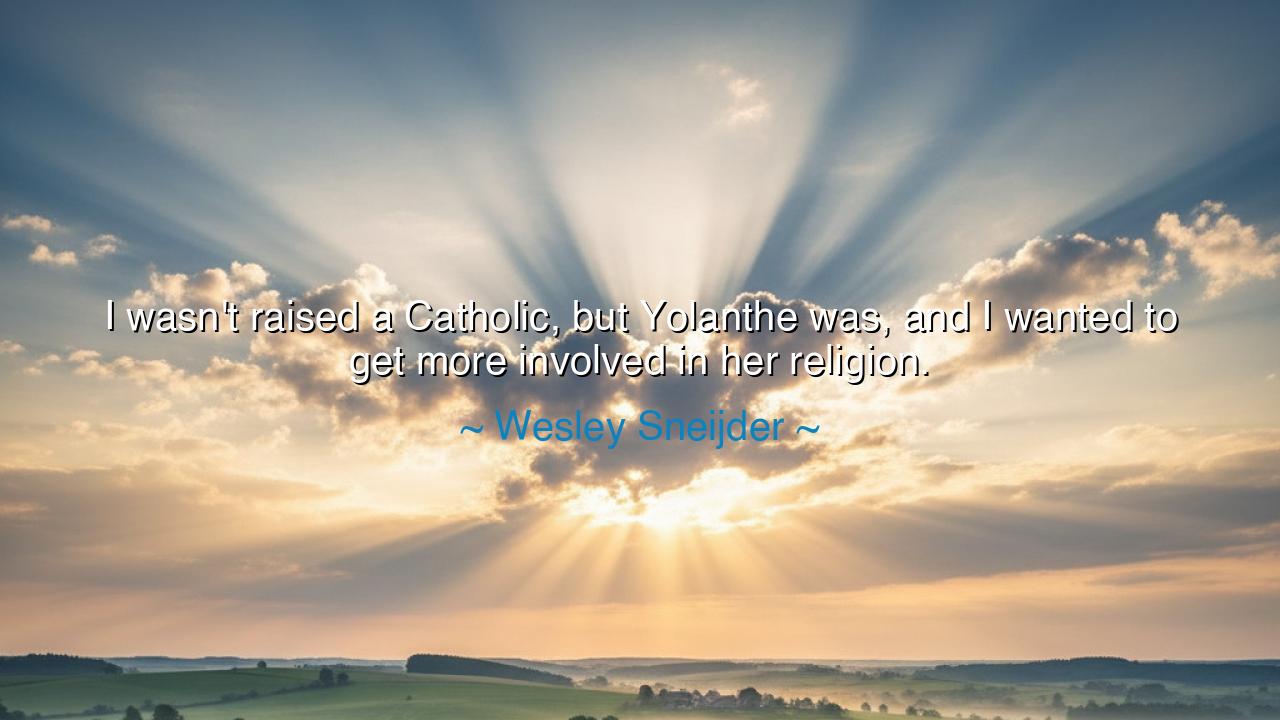
I wasn't raised a Catholic, but Yolanthe was, and I wanted to get
I wasn't raised a Catholic, but Yolanthe was, and I wanted to get more involved in her religion.






"I wasn't raised a Catholic, but Yolanthe was, and I wanted to get more involved in her religion." These words spoken by Wesley Sneijder carry with them a deeply human sentiment—the desire to connect with someone you love on a deeper, more spiritual level. In his statement, Sneijder reveals an important aspect of human nature: our ability to embrace and explore new beliefs and practices, not out of mere curiosity, but out of a genuine wish to understand and share the world of someone dear to us. His words speak to the idea of spiritual growth that comes not from obligation, but from love and connection.
This is not a new concept. In the ancient world, the idea of sharing beliefs and spiritual practices for the sake of relationships was common. The Greek philosophers, especially those from the Hellenistic period, understood the power of unity in relationships and the ability of love to transcend personal boundaries, including the boundaries of religion and culture. For example, Socrates famously married Xanthippe, a woman with whom he may not have shared the same intellectual or spiritual practices, yet their bond was central to his life. Socrates saw marriage and relationship as opportunities for mutual growth, even if that growth came through differences in background or belief. The lesson is clear: love can be a powerful motivator to understand and engage in someone else’s worldview.
Consider the life of Alexander the Great, a figure whose personal relationships had a profound influence on his worldview and, indeed, his conquests. Alexander’s relationship with Hephaestion, his closest companion, is said to have influenced his views on religion and culture. Though raised with a Greek belief system, Alexander’s travels and experiences led him to embrace elements of Persian and Egyptian beliefs. His willingness to adopt and adapt aspects of the cultures he encountered speaks to the universal truth that love and companionship can inspire us to explore, understand, and integrate new ideas into our lives. Alexander’s life reflects the deep interconnectedness between our personal relationships and our spiritual evolution.
In more recent history, Martin Luther King, Jr., though born and raised in the Christian tradition, was deeply influenced by the teachings of Mahatma Gandhi, whose belief in nonviolence and truth was rooted in Hinduism and Jainism. King’s ability to embrace aspects of Gandhi’s philosophy was not merely intellectual; it was deeply connected to his commitment to justice and love for his fellow human beings. Gandhi’s spiritual beliefs, though different from King’s Christian roots, inspired King to seek out a more profound connection with the principles of love and compassion, which transcended the specific doctrines of his upbringing. Like Sneijder’s willingness to engage with his partner’s religion, King’s story shows how love and compassion can lead us to explore and adopt practices outside our own initial worldview.
Sneijder’s desire to understand Yolanthe’s religion—Catholicism—reflects this same human need to connect on a deeper level, to understand the spiritual beliefs that are important to those we hold dear. It is an acknowledgment that spiritual beliefs are not isolated from our relationships but are often integral to the bond we share with others. His words illustrate the profound truth that we do not always choose our beliefs based on logic or upbringing, but sometimes on the desire to build a bridge to another person’s world, to engage in their spiritual journey, and to grow together.
The lesson from Sneijder's statement is one of openness and curiosity. It teaches us that the exploration of others’ beliefs and spiritual practices can be an act of love, not just intellectual curiosity. It is about seeing religion not as a system of rules to follow, but as a living experience, one that can be shared, understood, and adapted in the context of relationships. By engaging with another’s faith, we create deeper connections, not only with them but with the worldview they hold. It is through these shared moments of understanding that we discover a richer, more compassionate life.
In practical terms, we can take this lesson by seeking out understanding in our own relationships. Whether we are married, friends, or even just acquaintances, we can take the time to learn about and engage with the beliefs of others, even if they differ from our own. This does not mean we must change our beliefs, but we can expand our hearts and minds by recognizing the value in others' perspectives. It is through love and curiosity that we open ourselves to deeper connections, and in doing so, we find that our lives are enriched by the spiritual journeys of those around us.
Let us embrace this truth: love and spirituality are intertwined, and when we open ourselves to the faiths of others, we become more connected, more compassionate, and more whole. It is not about converting or abandoning what we know, but about expanding our understanding and building bridges between hearts.






AAdministratorAdministrator
Welcome, honored guests. Please leave a comment, we will respond soon